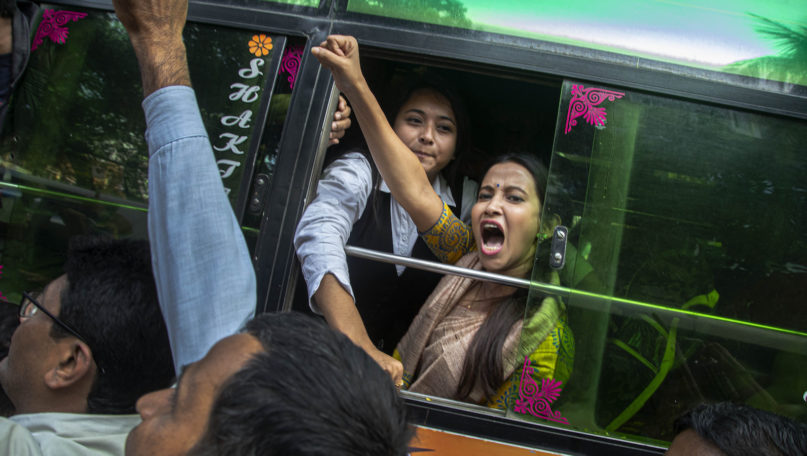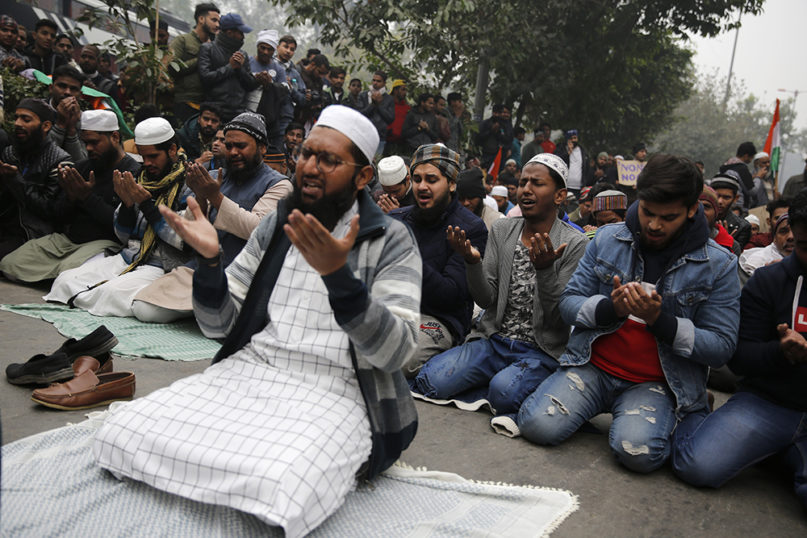
In December, after watching on YouTube as Indian police fired tear gas at student protesters at Jamia Islamia University in New Delhi, Bilal Hussain* immediately tried to get hold of his niece, a student there. She told him she had been studying in the library when police stormed the room with tear gas, barricading students inside as they scrambled for cover.
Learning that violence was also flaring in Muzaffarnager, in the northern state of Uttar Pradesh, Hussain tried to reach relatives there by phone and Facebook Messenger. They live in a Muslim enclave where police are alleged to have detained and tortured Muslim children and raided Muslim homes while chanting Hindu nationalist slogans and Islamophobic slurs. Hussain was frightened for their lives. With internet and phone lines in the area, it took days before he could reach them.
From his home in Southern California, Hussain, 36, felt a disquiet he has known since he was a child. Born in Chicago, where India’s religious divides are often replicated in the South Asian diaspora in the U.S., he grew up conscious of violence and bigotry, both in India and at home.
“It’s time that we hold the local community accountable,” he said.
This weekend (Jan. 18-19), Hussain will help to lead protests to do just that. South Asian Americans will demonstrate in Indian districts throughout the U.S. — from Pioneer Boulevard in Artesia, California, near Los Angeles, to Newark Avenue in Jersey City, New Jersey — against India’s Citizenship Amendment Act.

A woman shouts slogans from inside a bus after being detained during a protest against the Citizenship Amendment Act in Gauhati, India, on Dec. 17, 2019. (AP Photo/Anupam Nath)
The law, an initiative of Indian Prime Minister Narendra Modi’s Hindu nationalist Bharatiya Janata Party, fast-tracks citizenship for refugees of all major South Asian faiths from Pakistan, Afghanistan and Bangladesh who have been in India since before 2015 — all faiths, that is, except Muslims. Opponents call it a religion test for migrants hoping for naturalization.
Coupled with a register to identify and deport undocumented immigrants in India’s northeastern state of Assam — where Muslims who have been left off the list face the risk of statelessness and being sent to detention camps — critics argue the citizenship act is yet another step at marginalizing India’s Muslim community.
Since it passed in December, hundreds of thousands of protesters have rallied in Indian cities to defend what they see as an attempt to destroy the secularism enshrined in India’s Constitution and make India a Hindu nation. In the United States too, protesters have rallied at public parks, universities and Indian consulates.
But the aim of this weekend’s protests, which organizers are calling a “National Day of Action,” is less to call out the Indian government itself than to challenge the slice of the Indian and Indian American community in the U.S. sympathetic to India’s right-wing politics.

Muslim protesters pray on a road near the historic Red Fort in New Delhi on Dec. 19, 2019. Police detained several hundred protesters in some of India’s biggest cities that day as they defied a ban on assembly that authorities imposed to stem widespread demonstrations against a new citizenship law that opponents say threatens India’s secular democracy. Dozens of demonstrations took place around the country as opposition grew to a new citizenship law that excludes Muslims. The law has sparked anger at what many see as the government’s push to bring India closer to a Hindu state. (AP Photo/Altaf Qadri)
“This protest is about the diaspora drawing a line in the sand,” said Thenmozhi Soundararajan, executive director of Equality Labs, a South Asian American social justice organization. Charging that a “vocal minority” has been “supporting genocide and fascism,” Soundararajan vowed: “We are not going to be complicit as a whole.”
A significant proportion of U.S. Indians come from upper-caste Hindu communities whose politics generally align with Modi and the BJP. Many generate funds for Indian political causes, though the extent and influence are difficult to prove because of the myriad of covert and informal ways they can donate money.
The U.S. State Department once refused Modi a visa for his failure to stop a pogrom in Gujarat state in 2002 that killed more than 1,000 people, mostly Muslims, when he was chief minister. But his supporters pushed for a repeal of his visa ban.
Click here to read more.
Source: Religion News Service